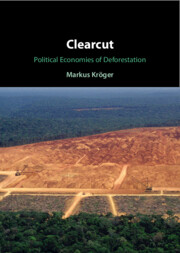Clearcut
Regionally dominant extractive sectors – including Brazilian cattle ranching, Amazonian narco-gold mining, and Finnish paper pulping – provide the foundation for this book’s analysis of the range of motivations for deforestation. This framing allows for a discussion of the global political economy and ecology in general, and for an in-depth examination of the varieties of extractivisms that define land and resource use. The chapters take an interdisciplinary approach, drawing on political ethnography and world systems analyses across the Global North–South divide. The book develops and applies a new theory that identifies regionally dominant political-economic systems as the driving forces behind deforestation. This book is essential reading for advanced students, researchers, and policymakers working in (de)forestation, environmental studies, environmental law, economics, conservation, climate change, and sustainability, leading to a deeper understanding of why our planet’s forests are under threat. This title is also available as Open Access on Cambridge Core.
Markus Kröger is Professor of Global Development Studies at the University of Helsinki. He has focused on the politics of extraction and resistance amid global climatic-ecological crises. He has published four books and many articles on forestry, mining, agriculture, and agroforestry dynamics, focusing especially on South America, India, and the Arctic.
